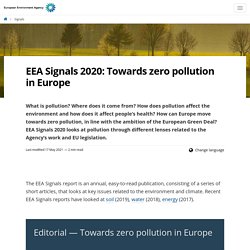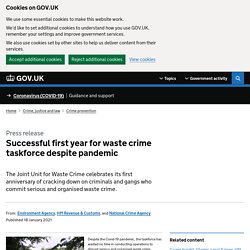

Mélodie - Ya'nienhonhndeh : Un projet d’aire protégée autochtone et une forêt vierge dans la région de Québec - Nature Québec : Nature Québec. De nos jours, rares sont les forêts vierges au sud de la limite nordique des forêts exploitées.

Mélodie - Qu’est-ce que l’écoféminisme ? - Nature Québec. L’écoféminisme, un terme issu de la contraction des mots écologie et féminisme, est un mouvement qui fait le lien entre l’exploitation des femmes et la destruction de l’environnement.

Selon la thèse principale de l’écoféminisme, il y a des similitudes et des causes communes aux comportements de domination et d’oppression des femmes, et aux comportements qui contribuent au saccage environnemental. En fait, les femmes comme la nature sont victimes de la domination masculine. Ainsi, pour qu’une révolution écologiste ait lieu, il faut absolument qu’une révolution féministe ait aussi lieu afin de contrer le système de domination du patriarcat sur la nature et les femmes. Le terme écoféminisme a été publié pour la première fois par Françoise d’Eaubonne en 1972 dans son livre Le féminisme ou la mort. 10 bonnes nouvelles - pour se réjouir quand même en 2020! - Fondation David Suzuki.
Peut-être qu'une de ses nouvelles peut faire une brève? – observgo
Mélodie - Le Canada doit s’attaquer au racisme environnemental - Fondation David Suzuki. Mélodie - WWF Report PTM FR v4. Mélodie - UK plant science research strategy – UKRI. This strategy highlights the challenges and opportunities for the next 10 years of plant science research.

Document Details This strategy was led and authored by Professor Jane Langdale CBE FRS, University of Oxford, with extensive consultation with members of the research and innovation community, and was discussed by BBSRC Council in September 2020. Mélodie - Major blueprint to create green jobs and slash emissions from industry, schools and hospitals. Over £1 billion allocated to drive down emissions from industry and public buildings like schools, hospitals and council buildings new Industrial Decarbonisation Strategy sets vision for world’s first low carbon industrial sector, slashing emissions by two-thirds in just 15 years package of measures will put the UK at the forefront of the global green industrial revolution, creating and supporting up to 80,000 jobs over the next 3 decades An ambitious blueprint to deliver the world’s first low-carbon industrial sector and over £1 billion to cut emissions from industry, schools and hospitals has been announced by the Business and Energy Secretary today (Wednesday 17 March).

Building on the Prime Minister’s 10 Point Plan for a Green Industrial Revolution published last year, the new Industrial Decarbonisation Strategy sets out the government’s vision for building a competitive, greener future for the manufacturing and construction sector. Business and Energy Secretary Kwasi Kwarteng said: Event summary: Policy implications of cryosphere science for the 1.5°C target event. - POST. This event was held in conjunction with the non-partisan International Cryosphere Climate Initiative (ICCI), as one of a series of “Cryosphere 1.5°C Briefings”.

These bring together leading IPCC and other academics together with stakeholders such as national climate negotiators and domestic policy makers on the policy implications at all levels arising from the latest science focused on cryosphere (snow and ice) regions including climate negotiations at COP 26. Insufficient emissions reductions could lead to warming scenarios beyond 1.5°C that trigger global changes and feedbacks in the cryosphere that may be rapid and to some degree irreversible (several tens of thousands of years). The most significant dynamics include sea-level rise from polar ice sheets; polar ocean acidification; mountain glacier loss; permafrost thaw and related CO2/methane emissions; and, Arctic sea ice loss.
Mélodie - Woodland creation - POST. Growing trees draw carbon dioxide (CO2) from the atmosphere through photosynthesis and store some of this carbon in wood and in the soil.

Although there are concerns that woodland creation could distract from the need to reduce emissions, increasing tree cover is one of the few proven methods of removing greenhouse gases from the atmosphere and can deliver other benefits. The UK Government has an overarching commitment to create 30,000 hectares (ha) of woodland per year by 2025, and the devolved administrations have their own woodland creation targets, strategies and grant schemes. Mélodie - Council of Canadian Academies. Close Connected, autonomous, shared, and electric (CASE) vehicles offer the promise of a more effective, efficient, and integrated transportation system with reduced congestion, fewer collisions, and greater mobility options.

They could lead to improved equity and accessibility in transportation for older adults, children and youth, people with limited mobility, and those living in areas underserved by public transportation. But realizing the potential of CASE vehicles will require coordinated interaction and decision-making among government authorities at all levels, as well as with relevant industry stakeholders, associations, and international organizations. Main findings CASE vehicle technology is rapidly evolving; it is reasonable to expect some limited applications and impacts over the next 10 years.
Mélodie - The Atlin Hydro Project Jan2021. Alexandru - EEA Signals 2020: Towards zero pollution in Europe. The EEA Signals report is an annual, easy-to-read publication, consisting of a series of short articles, that looks at key issues related to the environment and climate.

Recent EEA Signals reports have looked at soil (2019), water (2018), energy (2017). Editorial — Towards zero pollution in Europe. Papol - Successful first year for waste crime taskforce despite pandemic. Criminals operating in the waste industry are being warned that the Covid-19 pandemic is not stopping the authorities from cracking down on their illegal activities, as the Joint Unit for Waste Crime (JUWC) heralds a successful first year in operation.

Launched in January 2020, the multi-agency taskforce was the first of its kind to formally bring together environmental regulators and law enforcement agencies to tackle serious and organised waste crime which is estimated to cost the UK economy at least £600 million a year and cause great harm to the environment, local communities and businesses. Despite the Joint Unit being in its infancy when the Covid-19 pandemic struck, the taskforce has wasted no time in sharing intelligence, identifying illegal activity and conducting numerous operations to disrupt illegal activities, leading to arrests of suspected waste criminals and bringing them to justice.
Nicola Lawton, JUWC Deputy Director for Enforcement, said: JUWC case studies. Papol - Principles and conditions for a green recovery from COVID-19 in Canada. Key Messages The COVID-19 crisis, while difficult and tragic, also provides a critical opportunity to align efforts to meet Canada’s climate goals with the challenge of economic reconstruction post-pandemic.IISD has developed seven "green strings" recommendations: key principles, criteria, and conditionalities that should be applied to government measures for economic recovery from COVID-19 to ensure a green recovery.Canada’s leading environmental groups, representing close to two million people, have signed on to the recommendations, including the Pembina Institute, Climate Action Network Canada, David Suzuki Foundation, Environmental Defence, Greenpeace Canada, Équiterre, Ecojustice, Ecology Action Centre, Conservation Council of New Brunswick, Stand.earth, Leadnow, Sierra Club Canada Foundation, and Wilderness Committee.

The reasons to set and apply "green strings" are clear: Matthieu - Competition Policy supporting the Green Deal goal. Matthieu - Circular Economy: Member States delaying the inevitable targets. Patrick -> Vers une utilisation durable des terres. ENREGISTREMENT VIDÉO - webinaire L’utilisation des terres occupe une place centrale dans les nombreux des défis environnementaux et socioéconomiques d’aujourd’hui. Comprendre comment nourrir les populations mondiales, tout en s'attaquant au double défi de la perte de biodiversité et du changement climatique est donc une question clé pour les décideurs politiques. Comment les gouvernements peuvent-ils aligner les stratégies nationales pour parvenir à une utilisation durable des terres? Quels arrangements institutionnels favorisent l'élaboration de politiques cohérentes dans le lien entre l'utilisation des terres, le climat, la biodiversité et l'alimentation? DH-Green budgeting.
Management of Conflicts of Interest in Procurement Activity and Grants Programs. Procurement of Strategic Water Entitlements. Mélodie - What Joe Biden’s climate plan means for Canada. The crucial words came during the second United States presidential debate on Oct. 22. In a discussion about climate change and energy, Democratic candidate Joe Biden declared that he would lead a transition to renewable energy: “I would transition from the oil industry, yes.” He also promised to eliminate federal subsidies to the oil industry and move to net-zero emissions by 2050. President Donald Trump, sensing a major blunder by his opponent, called on voters in Pennsylvania, Texas, Oklahoma and Ohio to vote against Biden’s energy plans. The moment was noteworthy because it highlighted the new political importance of climate change and energy policy in U.S. politics.
Serious climate plan Although Biden’s climate plan is not as ambitious as the Green New Deal advocated by the left of the Democratic Party, his plans are serious. Mélodie - How to build a better Canada after COVID-19: Launch a fossil-free future. This story is part of a series that proposes solutions to the many issues exposed during the coronavirus pandemic and what government and citizens can do to make Canada a better place. Demand for fossil fuels collapsed during the COVID-19 pandemic as lockdown measures were introduced. In the second quarter of 2020, experts predict that global oil demand will be down 20 per cent from this time last year.
Although demand is likely to recover somewhat in the next two years, some major oil company executives believe that it may never return to pre-2020 levels. At the same time, the world remains “on fire” due to climate change, caused primarily by the burning of fossil fuels. PP- Guide Pratique de la Smart City - Tome 4 : La mobilité de demain.
Guide très intéressant: La Smart Mobility, ou la mobilité intelligente et durable, regroupe l’ensemble des solutions visant à exploiter de la manière la plus optimale possible les infrastructures, les véhicules et le matériel pour faciliter la mobilité des individus et des marchandises. La mobilité intelligente est donc un concept large qui facilite la transition durable d’un territoire en optimisant les services de transport, tout en tenant compte des enjeux technologiques, sociétaux, économiques et environnementaux. – observgo
Mélodie - 7 lessons Canada should use from WW2 to fight the climate emergency. Canada’s approach to climate change for the past 30 years is simply not working. Greenhouse gas emissions in the year 2018 (the last year for which we have statistics) were almost exactly where they were in the year 2000. We have run out the clock with distracting debates about incremental changes.
A new approach is needed. I have spent the last year and a half writing a book, A Good War: Mobilizing Canada for the Climate Emergency, about Canada’s Second World War experience, searching for lessons for how to confront the climate crisis and quickly transition off fossil fuels. RBQ - Lancement d'appels à projets pour la rénovation énergétique des bâtiments de l'Etat dans le cadre de France Relance - Ministère de l'Enseignement supérieur, de la Recherche et de l'Innovation. Brève - Modernising Energy Data. Overview Data is fundamental to the future of our economy, which is why it is the focus of one of the Grand Challenges in our Modern Industrial Strategy. In the energy sector, data is key to unlocking system and consumer benefits and managing the transition to a low carbon economy. With energy increasingly decentralised, millions of assets – solar panels, batteries, electric vehicle charge points and heat pumps –will need to be able to communicate with the operators of our networks, market platforms and each other.
New business models will emerge that will reduce consumer bills and system costs whilst driving decarbonisation. PP- Selon l’OCDE et l’AIE, les gouvernements devraient profiter des actions de relance post‑COVID‑19 pour éliminer le soutien aux énergies fossiles.
Possibilité d faire le lien avec l'autre doc de l'OCDE sur le post covid plus vert (Mélodie0 – observgo
Mélodie - What policies for greening the crisis response and economic recovery?: Lessons learned from past green stimulus measures and implications for the COVID-19 crisis. Mélodie - Green Stimulus in a Post Pandemic Recovery: The Role of Skills for a Resilient Recovery. Mélodie - Self SufficiencyNZ ChrisCoutts NZ.
Mélodie commente : je ne suis pas certaine de la pertinence, mais pourrait peut-être faire une histoire de cas. – observgo
Mélodie - After COVID-19, green investment must deliver jobs to get political traction. The most precipitous contraction of the global economy in a century has seen carbon emissions plummet. By the end of this year, emissions are likely to be 8% less than in 20191 — the largest annual percentage drop since the Second World War (see go.nature.com/3gej8th). To avert a global recession, governments are injecting trillions of dollars into stimulating their economies. Response to consultation on taxonomy and climate change - EEB - The European Environmental Bureau. Mélodie - Explained: Economic incentives to reduce waste - EEB - The European Environmental Bureau. Mélodie - Proposed European restriction on tattoo inks and permanent make-up: EEB and HEAL updated analysis - EEB - The European Environmental Bureau.
Mélodie - Industrial Transformation for a More Resilient Future - EEB - The European Environmental Bureau. Mélodie - Explained: Europe's new waste prevention and reuse laws - EEB - The European Environmental Bureau. Mélodie - How Is the Coronavirus Pandemic Affecting Climate Change? Mélodie - How Covid-19 Could Impact the Climate Crisis. Satellite images showing dramatic drops in air pollution in coronavirus hotspots around the globe have circulated widely on social media, offering a silver lining to an otherwise very dark story. But they are also a graphic reminder of the climate crisis that will continue when the pandemic passes. When the lockdowns are lifted and life returns to what it once was, so too will the pollution that clouds the skies and with it the greenhouse gases that fuel global warming. In fact, the rebound could be even worse. In the initial aftermath of the global financial crisis of 2008, global CO2 emissions from fossil fuel combustion and cement production decreased by 1.4 percent, only to rise by 5.9 percent in 2010.
And the crisis this time could have a longer-term impact on the environment — at far greater cost to human health, security, and life — if it derails global efforts to address climate change. And here the crisis might offer some grounds for hope. Mélodie - Quatre principes pour encadrer une relance indissociable de la crise climatique. Alors que le gouvernement du Québec annonce ses échéanciers de reprise, une chose est certaine: on ne reviendra pas au monde qu’on connaissait il y a deux mois seulement. Au-delà de la reprise des activités, le gouvernement doit planifier les actions qui permettront à nos industries de survivre dans ce nouveau contexte. Les sommes majeures qui seront investies vont orienter notre société pour de nombreuses années: il faut donc se saisir de cette crise pour préparer le Québec à relever les défis de demain, plutôt que de reprendre les choses là où on les a laissées.
La crise actuelle nous donne de précieux enseignements pour agir: (1) il est important de reconnaître les risques et de les prévenir; (2) lorsque les gouvernements se basent sur la science, il est plus facile de prendre des décisions qui transforment nos habitudes; (3) le débat politique est essentiel à une démocratie pour aller de l’avant. AG - Transformative policies for the climate challenge. To meet the scale and urgency of the climate emergency, business-as-usual in government won’t suffice. The IPCC report, which sets out what we need to do to keep global warming under 1.5°C by the end of century, has made it clear that we no longer have the luxury of time—change must happen now, across multiple sectors, and governments must adapt too. This climate challenge demands that we rethink the institutions, norms, beliefs and values that underpin our current governance structures and approach to policymaking.
Rather than continuing to place our hopes in incremental improvements to the work done by governments and public authorities, we need to foster a rich culture of innovation and experimentation within government. And we need to work with communities to bring them along on the journey. To stand a chance of responding to climate change, policymaking must become innovative, inclusive, radical—transformative.
Deep change How can we make this happen? The barriers we need to overcome. AG - In focus: Energy security in the EU. The constant supply of energy is something we often take for granted. AG - TCPA Practical Guides - Guide 12: Modern methods of construction. Matthieu.WEF The Net Zero Challenge. Matthieu.Hope from fear. Budget2021 EconomieVerte. PP - Budget2021 EconomieVerte - mesures pour un Qc vert. Mélodie - Crime and punishment - EEB - The European Environmental Bureau.
Mélodie - Response to public consultation on EU ETS State Aid Guidelines - EEB - The European Environmental Bureau. Mélodie #protectwater: letter the the EU from 130 NGOs - EEB - The European Environmental Bureau. Instructions et circulaires récentes. Mélodie - Mexico City, a megalopolis’ war on plastic bags. Mélodie - Why Australia’s 2019-2020 bushfire season was not normal, in three graphs.
Mélodie - New toolkit to help countries switch to climate-smart urbanization. Mélodie - Position paper on the EU “Farm to Fork” strategy - 2020 - EEB - The European Environmental Bureau. Mélodie - NGO position on EU restriction of microplastic - EEB - The European Environmental Bureau. Mélodie - [Municipales] À Dunkerque, l'héritage industriel devient un atout pour la transition énergétique.
Mélo - Eco-conscious resolutions for Clean Seas—it’s never too late. The Behavioural Insights Team. Why aren’t citizens rating their government? (Papo) Clock is ticking for waste criminals as new taskforce launched. (PaPo) Principles for Analyzing Federal Efforts to Facilitate and Promote Resilience to Natural Disasters .pdf. (Papo) Climate risk and response 2020.
On la garde en banque pour le prochain numéro – observgo
An assessment of the social costs and benefits of vehicle tax reform in Ireland.